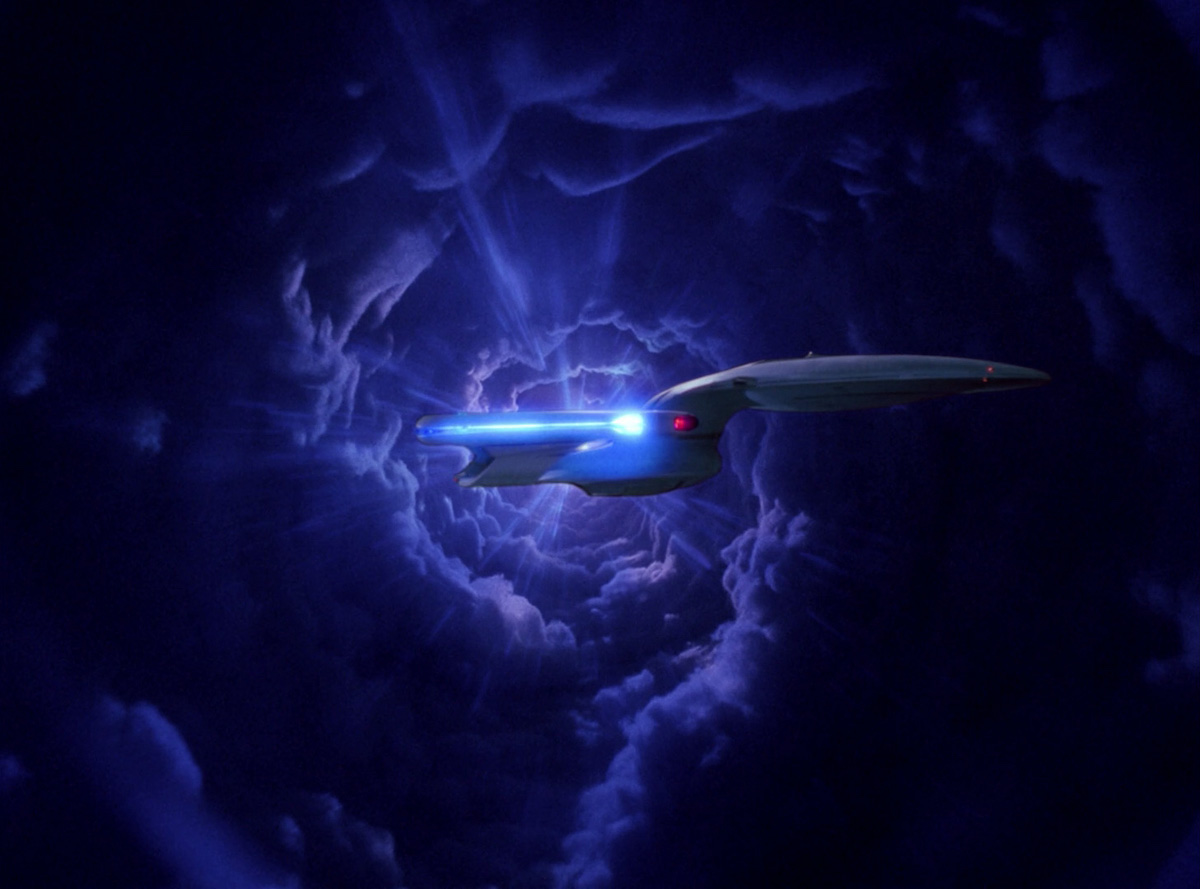“We may be on a road that has no turns.”
From the ridiculous to the sublime – if “The Royale” is my least favourite episode of the year, “Time Squared” is certainly its opposite number. I flipped my lid over this thing when it first aired, achieving something like a contact high by the time its thunderous climax was unfolding – Picard killing his duplicate, and the Enterprise pivoting 180 degrees in the mouth of the vortex to charge down the entity’s throat. It’s a damned sharp story, a personal highlight of the whole series. And hey, two Picards. That’s worth a few pages in someone’s book.
I am a lifelong fan of time loop fiction. (And yet, I’ve never seen Groundhog Day.) Star Trek: The Next Generation’s most noteworthy entry in that science fiction subgenre is the fifth-season episode “Cause and Effect,” but “Time Squared” is a more elliptical, fanciful, and far more psychologically unsettling precursor. This episode is plain disturbing to watch, largely because of how much its events disturb the nominally unflappable Captain Picard. From a lone shuttle, tumbling through space, we discover a second Picard who comes from six hours in the future – but six hours over the course of which the Enterprise will come in contact with a vortex in space, which will not only convince Picard to leave the ship, but will then destroy the ship for his having done so.
The other Picard really gets under our Picard’s skin – confronted, perhaps, by a version of himself that he interprets as a coward. The captain behaves rashly, almost petulantly, in the face of his doppelganger, while the all-too-short fragment of time preceding the Enterprise’s destruction slips away. The other Picard is lost in a canyon of physical and psychological disturbance due to the manner of his temporal displacement, which has thrown his entire being off-plumb until the Enterprise arrives back at the point in time he left. It’s all vastly preposterous from a real-science perspective, of course, but “Time Squared” is written and directed with such conviction that we take its made-up set of rules as absolute gospel as it’s unfolding. And hey, it’s such a neat set of concepts, anyway.
There’s a brief scene, right before the finale, where Picard and Riker share a strategic one-on-one that must surely be one of the best of their dialogues in the whole series: the two men as teammates, equals, untangling a mind-bending puzzle with the gravest possible consequences. The scene allows both Stewart and Frakes to give 110% in a nice bit of writing that lets Riker take the lead, offering guidance and counsel to his captain, while Picard all but admits he has no fucking idea what he’s going to do. It ends with the dread inevitability of cold death, as time runs out and the vortex appears. What does it all mean? I’ve never stepped back to think on it much, except to intuit that “Time Squared” is as terrifying as it is, precisely because of its no-nonsense approach to inevitability itself. The quote I’ve epigraphed above has stayed with me all my life: sometimes, for all our delusions of power and prowess, things are just going to go exactly the way they’re going to go. Out of our hands.
The cold open is an interesting little vignette for reasons all its own – Riker cooking eggs for his crewmates (Pulaski claims they will be omelets, but Will seems content to go for a quick scramble). I think we can reasonably assume that it’s just a lucky happenstance of an unserialized show, but the quick remarks between Riker and Pulaski about Will’s father – given what we later learn about Pulaski’s relationship with Riker Sr. – is pretty nifty in context once we get to “The Icarus Factor” next week. Plus, there’s something to be said for the fact that almost as soon as Star Trek: The Next Generation invents its sense of the technological superiority of the 24th-Century human race, it immediately begins trying to undo that superiority by suggesting that humans will endlessly try to get back to 20th-Century values and behaviours. That’s a bit quaint from an intellectual perspective (we’re hardly clamouring to do things the 16th-Century way nowadays, are we?), but grounds the show nicely. It suggests that you can sling around all the iPads (sorry, PADDs) you want, but people might yet want to read real books; so, too, will we forever cook real eggs. A gladness to me, as it’s my only real area of culinary mastery.
The best of the year, “Time Squared” earns an enthusiastic five Enterprises out of five.

Blogging The Next Generation runs every Tuesday as I work my way through every episode of Star Trek: The Next Generation on blu-ray. Season 2 is available now.
